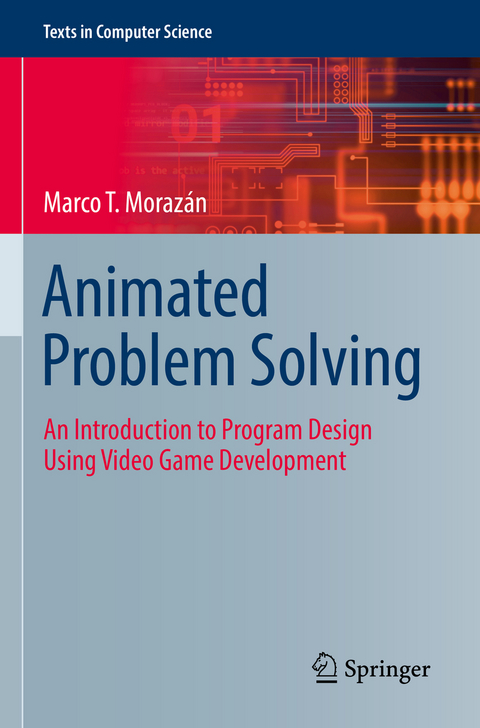
Animated Problem Solving
Springer International Publishing (Verlag)
978-3-030-85093-7 (ISBN)
This textbook is about systematic problem solving and systematic reasoning using type-driven design. There are two problem solving techniques that are emphasized throughout the book: divide and conquer and iterative refinement. Divide and conquer is the process by which a large problem is broken into two or more smaller problems that are easier to solve and then the solutions for the smaller pieces are combined to create an answer to the problem. Iterative refinement is the process by which a solution to a problem is gradually made better-like the drafts of an essay. Mastering these techniques are essential to becoming a good problem solver and programmer.
The book is divided in five parts. Part I focuses on the basics. It starts with how to write expressions and subsequently leads to decision making and functions as the basis for problem solving. Part II then introduces compound data of finite size, while Part III covers compound data of arbitrarysize like e.g. lists, intervals, natural numbers, and binary trees. It also introduces structural recursion, a powerful data-processing strategy that uses divide and conquer to process data whose size is not fixed. Next, Part IV delves into abstraction and shows how to eliminate repetitions in solutions to problems. It also introduces generic programming which is abstraction over the type of data processed. This leads to the realization that functions are data and, perhaps more surprising, that data are functions, which in turn naturally leads to object-oriented programming. Part V introduces distributed programming, i.e., using multiple computers to solve a problem.
This book promises that by the end of it readers will have designed and implemented a multiplayer video game that they can play with their friends over the internet. To achieve this, however, there is a lot about problem solving and programming that must be learned first. The game is developed using iterative refinement. The reader learns step-by-step about programming and how to apply new knowledge to develop increasingly better versions of the video game. This way, readers practice modern trends that are likely to be common throughout a professional career and beyond.
Marco T. Morazán joined Seton Hall University in 1999 where he teaches at all levels of the Computer Science curriculum including his signature courses on Problem Solving and Programming. He is a strong proponent of program by design in which types guide program development and the author of multiple peer-reviewed articles on computer science education and the implementation of programming languages. Animated Problem Solving is the result of over ten years learning from his students how to teach them type-based programming.
Part I: The Basics of Problem Solving with a Computer.- 1. The Science of Problem Solving.- 2. Expressions and Data Types.- 3. The Nature of Functions.- 4. Aliens Attack Version 0.- 5. Making Decisions.- 6. Aliens Attack Version 1.- Part II: Compound Data of Finite Size.- 7. Structures.- 8. Defining Structures.- 9. Aliens Attack Version 2.-10. Structures and Variety.- 1.1Aliens Attack Version 3.- Part III: Compound Data of Arbitrary Size.- 12. Lists.- 13. List Processing.- 14. Natural Numbers.- 15. Interval Processing.- 16. Aliens Attack Version 4.- 17. Binary Trees.- 18.- Mutually Recursive Data.- 19.- Processing Multiple Inputs of Arbitrary Size.- Part IV: Abstraction.- 20. Functional Abstraction.- 21. Encapsulation.- 22. Lambda Expressions.- 23. Aliens Attack Version 5.- 24. For-Loops and Pattern Matching.- 25. Interfaces and Objects.- Part V: Distributed Programming.- 26. Introduction to Distributed Programming.- 27. Aliens Attack Version 6.- 28. Aliens Attack Version 7.- 29. Aliens Attack Version 8.- Part VI: Epilogue.- 30. Advice for Future Steps.
| Erscheinungsdatum | 17.01.2023 |
|---|---|
| Reihe/Serie | Texts in Computer Science |
| Zusatzinfo | XIX, 688 p. 200 illus., 88 illus. in color. |
| Verlagsort | Cham |
| Sprache | englisch |
| Maße | 155 x 235 mm |
| Gewicht | 1056 g |
| Themenwelt | Informatik ► Software Entwicklung ► Spieleprogrammierung |
| Schlagworte | computer programming • distributed programming • Functional Programming • Game Development • object-oriented programming • Program Design |
| ISBN-10 | 3-030-85093-5 / 3030850935 |
| ISBN-13 | 978-3-030-85093-7 / 9783030850937 |
| Zustand | Neuware |
| Informationen gemäß Produktsicherheitsverordnung (GPSR) | |
| Haben Sie eine Frage zum Produkt? |
aus dem Bereich


